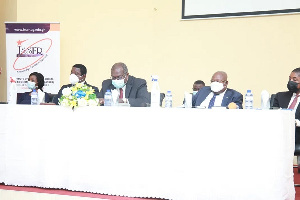Panelists at the ISSER dialogue Panelists at the Institute of Statistical, Social and Economic Research (ISSER) Development Dialogue have justified the need for synergies and long-term financing in the country in order to support businesses and promote investments.
The development dialogue was on the theme “National Development Banks and Sustainable Financing in Ghana”.
The panelists generally acknowledged that a well functioning national development bank (NDB) can play a role in filling major financing gaps.
Such large financing gaps exist in areas crucial for sustainable development, including infrastructure, agriculture, industrialisation, science, technology and innovation, as well as for financial inclusion.
Government in May this year signed an agreement with the European Investment Bank (EIB) for €170 million for the establishment of Development Bank Ghana (DBG).
The DBG is an integral feature of the GH¢100 billion Ghana Cares Obaatanpa project. It is a key pillar in Ghana’s efforts to quickly recover from the effects of the COVID-19 pandemic and is intended to be a model institution that supports the financial system to play its role in supporting the private sector to expand and create jobs.
Prof. Peter Quartey, Director of ISSER, in a presentation at the event stated that if the development bank is to succeed, it has to be devoid of political interference.
“We have to operate it as a business, not an anchorage of any political leadership. When we do that we will see it becoming sustainable.”
Sampson Akligoh, Director of the Financial Sector Division of the Ministry of Finance, indicated that the development bank will be independent and “fill the gap of long-term financing, which will be the future of the country in terms of growth and jobs.”
The immediate past dean of the University of Ghana Business School, Prof. Joshua Abor, explained that national development banks are important because of market failures.
“We know markets are imperfect, [they have] inefficiencies, and they are not able to adequately support or finance the private sector, [so] there is the need to introduce development finance initiatives,” he said.Speaking at the same event, Dr. Vera Fiador, a senior lecturer at the University of Ghana Business School’s Department of Finance, said some development banks in Ghana in the past failed due to factors such as financial sustainability, poor corporate governance, and weak regulation and supervision.She advised that if the new development bank is to reach its full potential, its institutional framework should be strengthened to ensure it does not suffer from undue […]
